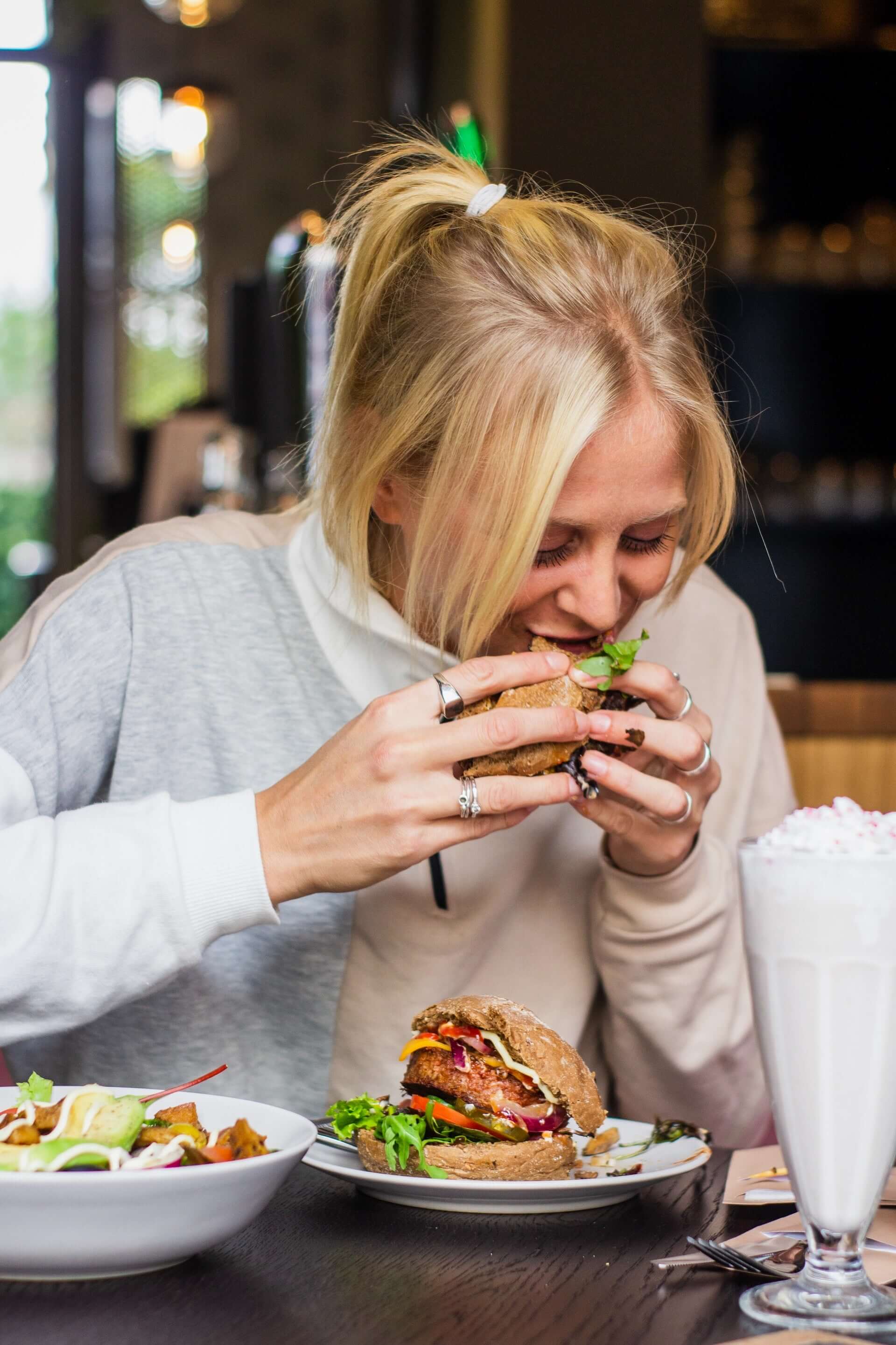
Inhaltsverzeichnis
Du isst, obwohl du nicht hungrig bist? – 5 Tipps
Kühlschrank auf, Kühlschrank wieder zu… Ein Snack hier, ein Nachschlag da… Manchmal essen wir, obwohl wir eigentlich gar nicht hungrig sind. Hier erfährst du, was du tun kannst, um dem vorzubeugen.
Warum esse ich, obwohl ich nicht hungrig bin?
Das kann verschiedene Gründe haben. Manchmal essen wir aus Langeweile oder aus Müdigkeit und Erschöpfung. Oftmals haben wir aber auch den Bezug zum achtsamen und intuitiven Essen verloren. Wir und unsere Körper sind es so gewohnt, zu jeder Zeit und überall an Essen heranzukommen, dass wir gar nicht mehr auf unser Hungergefühl angewiesen sind.
Das ist im Grunde eine ganz schöne Luxus-Situation, in der wir uns da befinden. Aber es hat eben auch den Nebeneffekt, dass wir essen, obwohl wir nicht müssten. Geschieht das häufiger und über einen längeren Zeitraum, nehmen wir zu oder fühlen uns schwer, träge und energielos.
Ich bin keine Ernährungswissenschaftlerin und möchte mich daher bei diesem Thema nicht zu weit aus dem Fenster lehnen. Trotzdem möchte ich gerne die Tipps und Tricks mit dir teilen, mit denen ich gelernt habe, wieder mehr auf mein intuitives Hungergefühl zu hören und weniger grundlos zu snacken.
1. Das Hungergefühl richtig einschätzen
Dieser erste Punkt geht Hand in Hand mit dem, was ich zuvor erwähnt habe. Herauszufinden, ob man wirklich hungrig ist, hört sich erst einmal kinderleicht an. Für viele Menschen ist das aber gar nicht so einfach, z.B. weil man nicht so stark mit den eigenen Körperempfindungen in Verbindung steht.
Hunger ist erstmal ein physisches Empfinden und kann beispielsweise an einem knurrenden Magen erkannt werden. Das Gelüst nach einem Stück Schokolade oder einer Pommes mit Ketchup und Mayo entsteht in den meisten Fällen aber nicht durch Hunger sondern durch das psychische Verlangen nach zucker- oder oder kalorienhaltiger Nahrung.
Wenn du Schwierigkeiten damit hast, einzuschätzen, ob du gerade wirklich Hunger hast oder nur ein Verlangen nach Essen, dann versuch es mal damit, ein Stück Obst zu essen. Manchmal reicht auch allein schon die Vorstellung aus. Man merkt schnell, ob man Lust darauf hat, einen Apfel oder ähnliches zu essen. Wenn sich der Gedanke nicht reizt, dann ist die Wahrscheinlichkeit groß, dass du keinen Hunger hast. Wenn doch, dann greif gerne zu.
Es kann ein bisschen dauern, die Signale des Körpers wieder richtig einzuschätzen, nachdem man für eine längere Zeit nicht mit ihnen in Kontakt stand. Anfangs reicht es auch aus, sich selbst zu beobachten, wann man was isst und wie man sich körperlich in diesen Momenten fühlt. Das macht es einfacher, die Empfindungen des Körpers richtig zu deuten.
2. Hol’ dir Energie durch Flüssigkeit
Anstatt zu essen, kannst du auch zu Wasser greifen. Oftmals haben wir eigentlich viel eher Durst als Hunger, wissen das aber nicht richtig einzuschätzen. Hinzu kommt, dass viele von uns ohnehin zu wenig Flüssigkeit zu sich nehmen. Wasser ist aber für den Körper sehr wichtig und sollte definitiv nicht unterschätzt werden, denn ein anhaltender Wassermangel kann kann schwerwiegende Folgen für deine Gesundheit haben.
Genug zu trinken kann aber auch dabei helfen, nicht zu viel zu essen. Durch visuelle Hilfen wie das Platzieren einer Wasserflasche auf deinem Schreibtisch oder einer Kanne Tee auf dem Couchtisch erleichterst du dir das Trinken. Wenn du nicht so der Fan von schlichtem Mineralwasser bist kannst du es dir durch Zitrone, Minze oder Beeren ein wenig aufhübschen. Das kann wirklich einen großen Unterschied machen!
Wenn du also das nächste Mal auf den Kühlschrank zuläufst oder dir einen Snack aus dem Vorratsschrank holen möchtest, trinke zunächst ein großes Glas Wasser, lass ein wenig Zeit vergehen und schau dann nochmal, ob du immer noch hungrig bist.

Photo by Dylan Alcock on Unsplash
3. In Bewegung kommen
Durch Nahrung bekommen wir Energie – Schließlich ist Essen für unseren Körper sowas, was Benzin für ein Auto ist. Wenn wir uns also kraft- oder energielos fühlen, greifen wir gerne mal nach Essen. Wir wissen zwar, dass es noch eine ganze Menge anderer Wege gibt, wieder Energie zu bekommen. Aber Nahrung ist meist das, was am einfachsten umzusetzen bzw. zu erlangen ist.
Ich habe eine Liste mit Aktivitäten zusammengestellt, die ich gerne mache, um wieder mehr Energie zu bekommen. Ganz oben stehen einige körperliche Aktivitäten, die mit Bewegung zu tun haben. Denn Bewegung regt unseren Blutkreislauf an und versorgt unser Gehirn mit Sauerstoff. Auf meinem Zettel steht beispielsweise “Einen Spaziergang machen”, “Tanzen”, “Yoga” oder “Dehnen”. Vielleicht passt zu dir aber viel eher, Joggen zu gehen, mit deinen Kindern zu spielen oder Rad zu fahren. Schließlich hat jede:r von uns Spaß an anderen körperlichen Aktivitäten.
Wenn ich dann uninspiriert und erschöpft bin, schaue ich auf meine Liste und suche mir eine körperliche Aktivität aus, auf die ich gerade besonders Lust habe oder die ich einfach umsetzen kann. Es geht nicht darum, ein Ein-Stunden-Workout einzuschieben oder sich direkt zu verausgaben. Im Endeffekt solltest du etwas finden, das für dich funktioniert und dir Spaß macht. Eine kleine Runde um den Block zu laufen reicht oft auch schon aus, um sich wieder fitter zu fühlen. Und das ganz ohne zu Essen gegriffen zu haben.
4. Mehr Mahlzeiten, weniger Snacks
Über den Tag werden wir müde und natürlich auch physisch hungrig. Damit kommt auch oft die Ungeduld und wir schnappen uns das, was am nächsten liegt oder am einfachsten zuzubereiten ist. Das ist zumeist aber leider auch nicht die nährstoffreichste Option.
Um zu vermeiden, einen Snack nach dem anderen zu essen, muss man sich bewusst bemühen, etwas “richtiges” zu essen. Anstatt also erst einmal eine handvoll Nüsse, dann Kekse und anschließend noch einen Joghurt zu essen, können Reste vom Vorabend aufgewärmt oder ein Gemüsewrap zubereitet werden.
Zubereitete Mahlzeiten sind ausgewogener in ihren Nährstoffen als eine Reihe von Snacks. Gute Fette, Proteine, Vitamine und Ballaststoffe halten länger satt und halten Gelüste in Grenzen. Auch die Regelmäßigkeit der Mahlzeiten kann einen großen Einfluss auf unsere Snackgewohnheiten haben.
Wer aber doch mal snacken will / muss, kann sich gesunde Optionen bereithalten. Mein Lieblingssnack für solche Momente ist verschiedenes Gemüse, welches ich direkt nach dem Kauf aufschneide und dann im Kühlschrank lagere. Das muss ich dann nur noch aus dem Kühlschrank nehmen und in meinen geliebten Hummus dippen.
5. Achtsam essen
Wie oft hast du bereits gegessen, während du etwas anderes gemacht hast? Zeitung gelesen, am Laptop gearbeitet oder eine Folge deiner Lieblingsserie geschaut? Das Problem dabei ist, dass unser Gehirn nicht richtig registrieren kann, dass wir Nahrung zu uns nehmen, wenn wir dabei noch etwas anderes parallel machen. Das macht es schwieriger, unseren psychischen Hunger bzw. unsere Gelüste zu stillen.
Versuche also, weniger “nebenbei” und bewusster zu essen, wenn du Nahrung vor dir hast. Setze dich dafür extra an den Esstisch und pausiere alle anderen Aufgaben und Ablenkungen. Konzentriere dich dann beim Essen auf die verschiedenen Geschmäcker und Gerüche sowie das Gefühl in Mund und Magen. Das hilft Geist und Körper, das erlebte bewusst zu verarbeiten und beugt baldige Hungerattacken vor.
Du kannst dich auch selbst ein bisschen austricksen, indem du ungesunde Snacks außer Sichtweite lagerst oder erst gar nicht einkaufst. Die Forschung hat gezeigt, dass wir am ehesten das essen, worauf wir am schnellsten Zugriff haben.
Schließlich kann auch ein kleines Nickerchen helfen, wenn du dich schlapp fühlst und normalerweise zu Essen greifen würdest.
Das Beachten dieser (oder einige dieser) Tipps kann dir helfen, ein erhöhtes Bewusstsein für dein wirkliches, physisches Hungergefühl zu entwickeln und damit auch weniger grundlos zu essen. :)
Wenn du noch mehr über die Themen gesunde Ernährung, Achtsamkeit, Familie & Schwangerschaft oder Nachhaltigkeit erfahren möchtest, schaue doch mal hier vorbei.

Photo by Ross Sokolovski on Unsplash



























Leave a comment
This site is protected by hCaptcha and the hCaptcha Privacy Policy and Terms of Service apply.